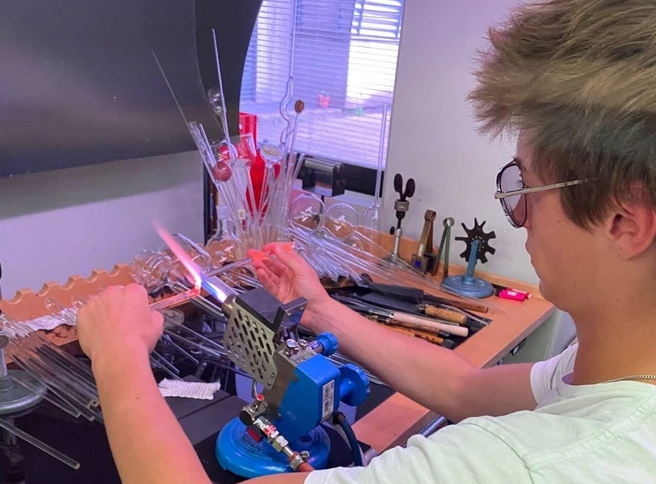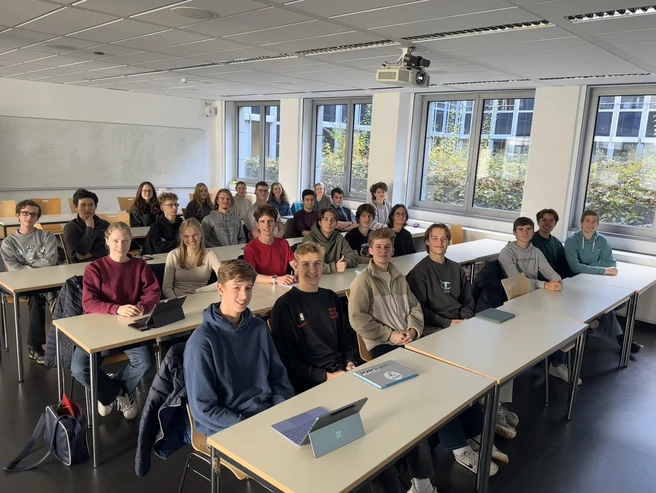TUMKolleg was initiated in 2009 in collaboration with the Otto-von-Taube Gymnasium Gauting and was joined by the Werner-Heisenberg-Gymnasium Garching in 2016.
The program’s aim is to stimulate talented students with an interest in STEM subjects both in theory and in practice. During their final 2 years of Gymnasium (university preparatory school), around 15 students from each school spend Wednesdays at TUM engaged in research and learning; all other days of the week, they follow regular classes at their respective school. Prospective students are selected by their Gymnasium based on grades, a motivational letter, and an interview.
Many universities offer open days and guided tours for Gymnasium students, or even Frühstudium in one or more subjects for talented and interested students. Indeed, TUM is also involved in this. However, TUMKolleg is quite unique as it involves a period of almost 2 years during which the TUMKollegiaten (TUMKolleg scholars) get to know the different schools and departments at TUM and their many different research topics. They learn to organize and research scientific projects and work on their own projects weekly in TUM laboratories during a period of 9 months. In addition, English communication skills, both oral and written, are strengthened.
The TUMKolleg program is divided into 3 distinct parts. During the first part, the so-called Studium Generale, TUMKolleg scholars visit different departments of the participating TUM Schools, where they are informed about the various study programs and research projects, and often have their first hands-on scientific experience. These visits should stimulate the scholars to propose a concept for their own research project, that is, the second part of the program. It is up to the coordinators to find a suitable TUM research group in which the individual scholar will be supported to conduct their research. Once a suitable supervisor and work environment have been found, the scholars spend roughly 9 months in the lab (March-December) to conduct their research. Not only are the results of the research documented and presented at the respective Gymnasiums, but often the research projects are submitted to such competitions as “Jugend forscht” and the Dr. Hans Riegel Research awards, where they have been very successful.
The third compulsory part of the TUMKolleg program consists of 3 to 4 weeks of international internship in a laboratory or organization abroad, whereby both topic and host are conceived by the TUMKolleg scholar. These three weeks take place in summer, often during the summer holidays, and offer the scholars the unique opportunity to gain both international interview training and work experience, as well as to deepen their language skills.
The 2025-2027 TUMKolleg is comprised of 28 students, 16 of whom come from the Otto-von-Taube Gymnasium and 12 from the Werner-Heisenberg-Gymnasium. Being a TUMKolleg scholar is serious business since the first visit to TUM as part of the Studium Generale took place on Wednesday, the 17th of September, only the second day of school. During this visit, hosted by Dr. Raimund Marx from the Department of Chemistry, much insight was given into the different chemistry degree programs and research areas. “Mixing the useful with the sweet”, the morning was concluded with a demonstration of the usefulness of liquid nitrogen, and the lemon sorbet thus created did not go amiss either. During the afternoon, the new TUMKolleg scholars visited the glassblowing workshop, a critical service enabling much of the research within the School, and had their first hands-on experience, synthesizing indigo and using it to dye a cotton bag blue. A further visit to the TUM School of Natural Sciences (NAT) is planned for the 10th of December, when the TUMKolleg scholars will visit the research neutron source Heinz Maier-Leibnitz (FRM II) and the PhotonLab.
Over the years, TUMKolleg scholars have been characterized as a diverse group of highly motivated young people with many interests, not just in STEM subjects. As stated by Johannes Heim, a new Q12 scholar from the Werner-Heisenberg-Gymnasium, one of his reasons for joining the program was to get to know TUM better to help him decide on what to do after graduation. Victoria Kolmsee, a current Q13 scholar from the Otto-von-Taube Gymnasium, mentioned that joining the TUMKolleg program at her Gymnasium has the added benefit of being instructed in very small groups in other subjects particular to the final examinations, such as chemistry, biology, mathematics, and English.
The new batch of TUMKolleg scholars will be looking for research groups to host them starting in March 2026. Of course, the type of research conducted within the NAT School makes it extremely difficult, if not impossible, to complete a project working only one day per week, especially since these scholars are equally required to attend a number of workshops during the Wednesday sessions. For this reason, Dr. Marx, TUMKolleg coordinator for the chemistry department, stresses that some of the research will have to take place during school holidays, such that whole experiments can be completed. As a small recompense for their invested time and effort, the research groups are entitled to 2.5 hours of working student time (HiWi) per week.
Taken together, TUMKolleg is a unique outreach program, the only one of its kind in Germany, allowing talented students from local Gymnasia to dive into current research themes both in theory and in practice. Ending with the words of Prof. Johannes Barth, Dean of the School of Natural Sciences, TUMKolleg is a great program whereby the engagement of all NAT departments is welcomed.
The coordination of TUMKolleg is in the hands of the TUM School of Education. Besides the School of Natural Sciences, the School of Computation, Information and Technology, the School of Engineering and Design, the School of Life Sciences, the School of Management, the School of Medicine and Health, the School of Social Sciences and Technology, as well as student organizations and external institutes participate in the program.
More information and links
- TUMKolleg (in German): www.tumkolleg.de
- Report by participating students: “The first day of our Studium Generale – a visit to the Department of Chemistry on September 17th, 2025” (in German) https://tumkolleg.de/besuch-im-department-chemie-am-17-09-2025-2/
- Video feature: “Gymnasium at the University: 10 Years of TUMKolleg” (in German) https://youtu.be/WJUZinjMc0M
Participating schools
- Otto-von-Taube Gymnasium Gauting www.ovtg.de
- Werner-Heisenberg-Gymnasium Garching www.whg-garching.de
Youth STEM science competitions
- Dr. Hans Riegel Stiftung https://www.hans-riegel-stiftung.com
- Jugend forscht https://www.jugend-forscht.de
Press contact
communications(at)nat.tum.de
Our team

